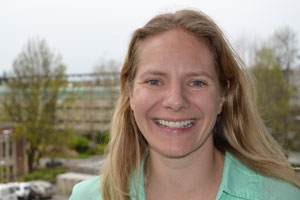Cynthia (Cynnie) Curl can't forget the quote. She said it 10 years ago, when she was interviewed by the New York Times after publishing a landmark study on pesticides and diet.

The study, from the University of Washington School of Public Health, showed that children who ate mostly organic foods had significantly lower levels of pesticide metabolites in their urine – one-sixth the amount found in children who ate food from conventional farms. Those results beg the questions Curl regularly receives: "Should I be buying organic? Does it really matter? Will it affect the health of my kids?" When the Times asked her in May 2003, she said, "We don't know. Nobody does."
Nearly a decade later, Curl says, "That quote has haunted me." But she says it has also driven her research as a doctoral student in Environmental and Occupational Health, where she studies the connection between pesticide exposure from food and the effects on health. Her academic pursuits were recognized recently when she was named the School's prestigious Magnuson Scholar for 2013-14.
Curl is one of six students in UW Health Sciences who will receive $30,000 each to support their studies. The Scholars were selected on the basis of academic performance and potential contributions to research in the health sciences. The award is named in memory of Senator Warren G. Magnuson and his health-care legacy.
"I'm so honored," said Curl, 36. "I'm a non-traditional student because I'm doing this while trying to work."
Curl grew up on farmland in rural southern Virginia and graduated from SPH in 2000 with a Master of Science from the Department of Environmental and Occupational Health Sciences. She spent several years as a research scientist with Professor Richard Fenske at the School's Pacific Northwest Agricultural Safety and Health Center.
After several years away, she returned to SPH in 2006 to work with Professor Joel Kaufman and the MESA Air (The Multi-Ethnic Study of Atherosclerosis and Air Pollution) project, where she manages a 10-year, $30 million grant. "I missed Seattle; I missed the UW," Curl says.
Kaufman encouraged Curl to study for a PhD while holding down her day job, she says. Curl proposed tapping into the massive dataset being collected by MESA researchers from across the country and including additional items on MESA questionnaires about frequency of organic food consumption. She's also analyzing urine samples and examining the relationship between pesticide exposure and effects on the brain such as mental processing speed and working memory.
"It's really fun," Curl says. "I don't know how people finish a dissertation if they don't have passion for the work they are doing. It's a long road."
She hopes her research will shed light on who's eating organic food and what influences their decisions, including income, education and the built environment. And while recent studies have shown evidence of a relationship between low levels of pesticide exposure and ADHD (Attention Deficit and Hyperactivity Disorder) prevalence in children, Curl expects her work to be among the first to determine if there is a link between pesticides, diet and health effects in older adults.
The results of her research could have important policy implications, she says, including how the government regulates agricultural pesticide use. She is also interested in communicating her work to the general public and recently gave a Public Health Café talk – sponsored by the Center for Ecogenetics and Environmental Health – to about 40 people in West Seattle.
"People are confused about all of their choices," Curl says. "There's so little information about the relative risks and benefits of the kinds of decisions we face every day in the grocery store."
Originally published on the School of Public Health website.